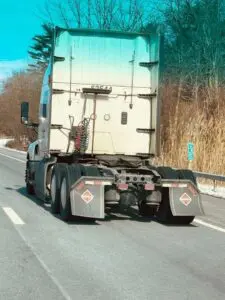What Is a Bobtailing Truck?

A bobtail truck is a semi-truck driving without its trailer attached – a sight you may have encountered on highways and roads. While these trucks might appear more manageable and safer without trailers, this configuration introduces unique hazards. Semi-trucks are specifically engineered to haul heavy loads, and when operating without a trailer, their weight distribution and handling characteristics change significantly, creating unexpected dangers. The Federal Motor Carrier Safety Administration (FMCSA) reports that bobtail trucks account for approximately 5% of annual truck accidents. Despite their smaller profile, these vehicles can still cause devastating injuries in collisions, which is why accident victims often require the expertise of a truck accident law expert.
If you have been injured by a bobtailing truck, you need a skilled truck accident lawyer.
Bobtail Trucks in Commercial Transportation
The term bobtail truck refers to a truck, usually a semi truck, driving without a trailer (also called a running bobtail). What can be confusing is there is more than one meaning of bobtail. This article focuses on the trucker slang meaning, trucks without trailers attached, but bobtail is also a term referring to a straight truck transporting propane gas.
Additionally, bobtailing and deadheading are sometimes used interchangeably, but they aren’t the same thing. Deadheading is when a truck is driving with the trailer attached, but it’s an empty trailer without cargo.
Running bobtail is dangerous because these trucks were designed to carry heavy trailers, with weight concentrated on the front wheels. When carrying a loaded trailer, the truck is balanced properly. When bobtailing, there is an uneven weight distribution. The role of front tires is more heavily steering, not braking, leaving a bobtailing semi truck more prone to instability on turns or curves in the road.
It isn’t only the front set of wheels that is causing issues. The rear wheels have less traction, meaning the truck isn’t able to slow down quickly and requires a longer braking distance than it would with the trailer attached.
If running bobtail isn’t safe, why are drivers doing it? Bobtailing can be unavoidable for truck drivers. Common scenarios where trucks bobtail include:
- After delivery of a load, especially when a return load is not immediately available from that location
- In between jobs for independent drivers, this often occurs with commercial truck drivers who are paid per load as opposed to hauling a specific trailer full-time
- When the truck needs maintenance or repairs only on the tractor unit of the truck
- Training or testing purposes
Have you been injured in a bobtailing accident? Contact Munley Law’s experienced truck accident attorneys for a free consultation.
Safety Risks and Hazards of Bobtailing
Removing the trailer from a tractor unit, significantly impacts how a semi truck handles. As mentioned above, there are a whole host of issues that occur when weight distribution is off; these include:
-
- Reduced brake efficiency
- Limited traction and stability
- Increased risk of jackknifing
- Weather-related complications
Don’t handle a bobtailing accident alone. Let our award-winning semi-truck accident attorneys protect your rights.
Why Bobtail Truck Accidents Happen
Driving a bobtail truck isn’t generally a truck driver’s favorite experience – no one loves driving an unstable vehicle. Even with driving training, accidents can happen. Bobtail accidents can often be attributed to:
- Drivers inexperienced at running bobtail
- Driver fatigue
- Mechanical failures
- Poor road conditions
- Improper truck maintenance
Our truck accident attorneys have recovered millions for injury victims. Schedule your free case evaluation today.
Physical Dynamics of Bobtail Trucks
 As a person who has likely never driven a semi truck, bobtail or otherwise, it can be hard to imagine what bobtailing feels like or understand the physical dynamics.
As a person who has likely never driven a semi truck, bobtail or otherwise, it can be hard to imagine what bobtailing feels like or understand the physical dynamics.
When a truck bobtails, most of the weight is over the front axle, leaving the rear axle light. This uneven distribution leads to reduced rear axle traction, making the truck prone to skidding or sliding, especially on wet or icy roads.
Issues with weight distribution are most visible when the truck driver is making sudden stops. With a trailer, the weight would be pushing down on the rear wheels, slowing the vehicle and providing stability. When bobtailing, that control and reduced speed are gone, making it difficult to come to a complete stop safely.
There are also handling and maneuverability differences with bobtail trucks. Without the cargo weight, the truck’s steering can feel “twitchy” or overly responsive. Drivers will particularly feel this when driving at higher speeds on the highway or when taking quick turns or curves.
Additionally, bobtail trucks have different braking dynamics than trucks with attached trailers. The truck’s braking system is typically calibrated to brake efficiently when it carries a heavy trailer. Without a trailer attached, the semi truck is more vulnerable to abrupt stops and can easily lose control. When bobtailing, braking power can be limited, especially in bad weather conditions, resulting in skidding, slipping, jackknifing, or other control issues.
If you’ve been injured in a accident with a bobtail truck, get expert legal guidance from our specialized truck accident team.
Steps to Take After a Bobtail Truck Accident
If you’re in a bobtail truck accident, the first thing to do is call for help and get to safety. Even if you don’t think you are injured, you may be in shock, and it’s important to seek medical attention. If it does turn out you are injured, you will need to have these medical records for your attorney to file a claim for compensation on your behalf.
If you can, document the scene with photos and videos, and collect witness information. Write down or take a video recording of your recollection of the events. All of this information will assist your attorney in getting you maximum compensation after the accident.
Time is critical after an accident involving a bobtail truck. Contact Munley Law now for immediate legal assistance.
Your Legal Rights in Bobtail Truck Accidents
If you have been injured in an accident involving a bobtail truck, you have legal options. When determining your legal rights, your Munley Law attorney will look at all the details of your case to identify liable parties. Liable parties can include the truck driver, the trucking company, or third parties.
Your attorney will look for all the parties who are at fault in a case and how. For example, if the accident occurred because the truck driver was tired, did he violate driver fatigue laws? If so, they could be held liable. If the trucking company didn’t sufficiently train its drivers to handle bobtail trucks, they may also be liable. Your experienced attorney will conduct a thorough investigation into your case to ensure you receive maximum compensation.
With good counsel, you can have a variety of compensation options on the table. Your attorney may seek compensation for:
- Medical expenses
- Lost wages
- Lost potential earning
- Pain and suffering
Bobtail Truck Insurance
Your attorney will also be negotiating with insurance companies. Semi-truck insurance is unique; bobtail trucks and their truck drivers are covered under a specific bobtail insurance policy that covers the truck when it is bobtailing but not actively working. When the trailer is attached, the bobtail is covered by primary liability insurance. Bobtailing truck cases aren’t like any other car accident case, which is why you need a lawyer who is well-versed in the trucking industry and bobtail accidents, not just any personal injury firm.
Time Limitations
In Pennsylvania, you only have two years from a bobtail truck crash to file a claim. Don’t miss your opportunity to get the compensation you deserve; protect your legal rights. If you’ve suffered injuries from a bobtailing truck, speak with our knowledgeable truck accident lawyers today.
Posted in Truck Accidents.
Tagged Claim Fault Insurance Liability Pain and Suffering Parties









